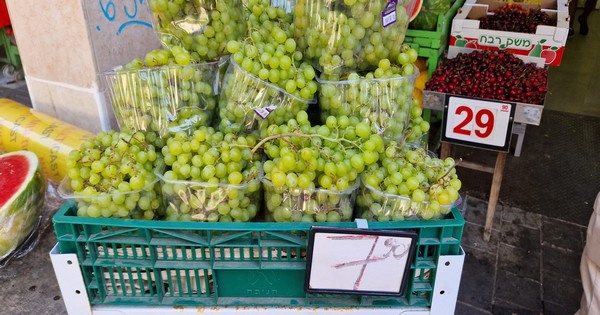The weaker Israeli Shekel exchange rate against other major trading currencies is coming as a relief and help for the country's fresh produce export sector. Exporters and producers can, after years of a stronger local currency, receive some respite and see slightly higher returns.

A fruit stall in Jerusalem, Israel.
The ongoing protests in Israel against the government's judicial review to limit the powers of the Supreme Court caused the Shekel to weaken against major currencies over the past few months.
Amir Porat, CEO of Gezer Shluhot, carrot growers and exporters in Israel: "The weaker Shekel is helping all exporters from Israel who suffered over the past few years from a very strong Shekel. It helps a bit now, but on the other hand, we need to get stability. Instability in the currency rates market is not good because we are buying and selling agricultural inputs in other currencies. You want to stabilize your business because we are buying plastics, wood, etc., and need things to be stable. Maybe it will correct for exports."
Although Israel exports carrots, avocados, dates, fresh herbs, and citrus fruit, including the popular Orri mandarin, it also imports a variety of other fruit. A weaker Shekel means imported fruit becomes more expensive for consumers.
Michael Amar, Marketing Director at Kibbutz Alumim, who are exporters of Orri mandarin, potatoes, and carrots, says: "First of all, what is happening in Israel is the opposite of democracy. It is a sad attempt by the radical right who himself wanted to carry out a legal reform to overthrow the government through manipulations and a lot of money that finances advertising and controlling the television channels. In the economic field, the situation in Israel is excellent. This is the time to invest here because it is a media bubble that will burst, and whoever invests, the exporters will benefit. This is good because the export currencies are high on the one hand, and the imports are high on the other hand, and this hurts Israeli consumers. In conclusion, the weaker Shekel is good for agriculture in Israel."
Israel's Central Bank raised the interest rate level at the end of February by half a basis point to a high of 4.25% to counter the creeping inflation that reached its highest point since 2008 at 5.4% in January 2023.
At the end of last week, the Shekel started to strengthen again after Israeli President Isaac Herzog's announcement that the opposition in parliament and the ruling coalition are close to reaching an agreement on the planned judicial reform. According to the Israel Central Bank, up to 6 March 2023, the shekel-dollar rate is down -2.047% at NIS 3.5890/$, while the shekel-Euro is NIS 3.8173/€ and -1.801% down, and the shekel-pound is NIS 4.3064/£ at -1.936% down.
For more information:
Amir Porat
Gezer Shluhot
Tel: +972 52 545 0781
Email: amir@shluhot.com
www.gezershluhot.com
Michael Amar
Kibbutz Alumim
Tel: +972 54779 2842
Email: michaela@alu.org.il
www.carrots.co.i
